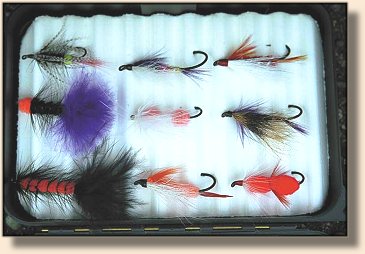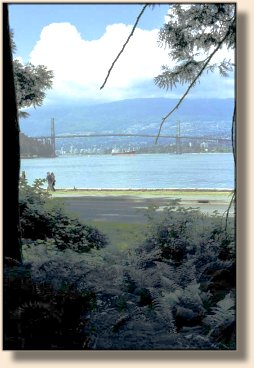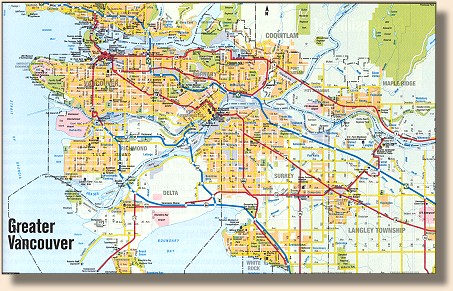Downtown Fly Fisher, Vancouver
Part 2
By D.C. Reid
STEELHEAD
Sadly, summer and winter steelhead have suffered civilization's culverting,
asphalting and strip mall building as much or more than other species. However,
Vancouver has good highway access to more than one fabled run. Two-and-a-half
to three hours to the east leaves the fly fisher at one of BC's big three for summer
steelhead: the South Thompson River in the arid interior plateau beyond the coast
range. You will not be disappointed – with the desert like the austere beauty of
the yellow, pine hills and with the 20 - 25 pound summer steelhead home to the
Spence's Bridge and Lytton areas.

For wet fly adventurers, try the gaudy Popsicle, or any number of large General
Practitioners or Spratley spey flies in low water dressings as December approaches.
While temperatures remain higher in October, waked Waller dries receive very
aggressive bites from the silver bullets of autumn. So strong are these fish that
they migrate up the Fraser at rates of 24 km per day. Prefered gear is a 12 - 15',
8 - 10 weight spey rod and don't forget wading cleats for the broad
boulder-choked waters and slippery algae-coated bottoms.
After Christmas, the Squamish and Vedder rivers come into their own for winter
steelhead until the native cherry and dogwood blossom in March and April. The
key is to get right to the bottom with high density sink tips carrying flies based
on orange, such as the Squamish Poacher or General Practitioner. Alternatively,
try a pink and simple Davie Street Hooker or a black Spey fly.
PINK SALMON
Just about the time your last dry fly swirls down with the first yellow sails of foot
wide maple leaves, it is time to consider once again the fall cycle of the lower
mainland. In odd numbered years, ie. 2001, the Indian and Harrison rivers
host fall runs of pink salmon, which can produce days of 20 fish or more.

Pink season is the time for fly fishers to learn their salmon fishing for these more
than eager 3 - 8 pound fish. The weather is warm, the water low and wadable
and the pinks willing to comply. Pink flies, shrimp patterns in flashabou and hot
pink, or the aptly named Crazy Charlie (a low water offering with a bead eye
to get down to suspended, staging fish) will connect.
Learn one little trick that George Vancouver could not have known that
jumping pink seldom bite. Keep those Polaroids trained on the blue-grey
glow that indicates a shoal of pinks holding deep, and sink that fly for the
swing toward their eager mouths.
A LITTLE FURTHER AFIELD
Higher up the Fraser River valley, the Skagit River flows west from the
mountains near Hope through a carefully preserved wilderness until it enters
Ross Lake and crosses the border into Washington State. Its July-October
fishery for rainbows and Dolly Vardens is excllent.
The river offers exceptional dry fly fishing and good nymphing. In July, try
stonefly nymphs in gold or black. In the heat of summer mayflies begin their
hatch. Try a Hare's Ear nymph, Zug Bug, Pheasant Tail, or Lafontaine
Nymph in sizes 12 - 16. Dry fly addicts should speckle their boxes with
Adams, Grey Wulffs and Green Drakes. Take along your 5 weight and
enjoy the pleasantness of needing only 25 – 40' casts to reach all the
runs in this sweet river.
LAKES
 Having the foresight to set aside a greenbelt running through the city, the city
of Surrey recently constructed Green Timber Lake by excavating 15 feet of
soil, flooding the depression with a nearby creek, and stocking it with rainbow
trout. This is the perfect place (there's a local bus service to the site) for the
beginner to sharpen up his or her skills, or to try out that new float tube.
Having the foresight to set aside a greenbelt running through the city, the city
of Surrey recently constructed Green Timber Lake by excavating 15 feet of
soil, flooding the depression with a nearby creek, and stocking it with rainbow
trout. This is the perfect place (there's a local bus service to the site) for the
beginner to sharpen up his or her skills, or to try out that new float tube.
Located on the west slope of the coastal mountains, the Chilliwack River Valley
traps and holds moist Pacific breezes. The valley virtually bulges with moss and
drips with water. A series of small alpine lakes here receive little fishing attention,
and this is a pity.

The largest among them, Cultus Lake, is home to Dolly Varden and cutthroat
weighing several pounds, as well as rainbows and whitefish. Fly fishers use
baitfish patterns in the spring or fall off-season periods near Main Beach and
Maple Bay, as well as at the mouths of inlet streams. For the serious hiker,
other lakes provide virtually untouched fishing. For example, Flora and Pierce
lakes offer spectacular rainbow at the end of a rigorous trek. Almost any dry
fly pattern receives a quick smack and double-digit days are the norm.
George Vancouver might have had neither the time nor the inclination to sample
the superb angling opportunities in the waters in and around the city which today
bears his name. But those who came after him have more than made up for his
omission. ~ D.C. Reid
|

